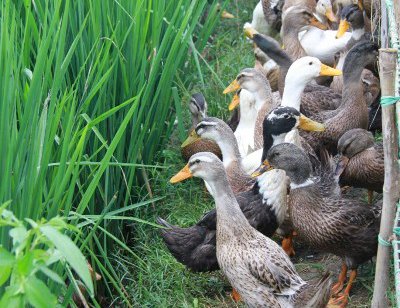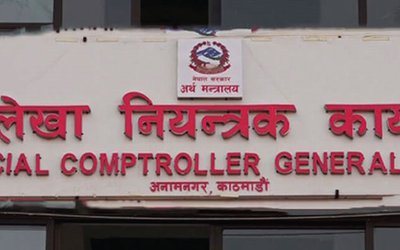
Practical Action has shown how a collaborative approach between the government and civil society organizations can help transfer technology to the people at the grass root level.
With the successful results coming from Practical Action’s Integrated Rice-Duck project, the government has shown interest to share the technology to broader groups of target.
Technology justice is a key to the overall development of any country. Thus, Practical Action has been making efforts to provide the technology to uplift the livelihood of poor and marginalized communities. The dice-duck pilot project is one of them. It intends to share the technology with the farmers.
“As Practical Action is celebrating 50 years of its establishment, we are working towards the promotion of technology, which includes the transfer of technology. By implementing the rice-duck pilot project, we are transferring this technology to the farmers,” said Achyut Luitel, head of Practical Action Regional Office.
Practical Action is working with Department of Agriculture Development and other various stake holders in this connection.
“I am very much impressed by the technology. Department of Agriculture Development is ready to work with Practical Action and to disseminate this technology at the grass root level. The Department will include rice-duck in its annual program so that they can also be part of this sharing,” said Director General of Department Yubak Dhoj G.C.
Although Kathmandu Valley has a long history of rice-duck farming, the tradition has vanished after the turning of the paddy fields into concrete jungles. Farmers used to have ducks which were sent to the rice fields unknowing its scientific implications.
However, Practical Action has come up with the rice-duck technology with an aim to increase the productivity and reduce malnutrition. Although integrated rice-duck pilot project is in the initial stage of implementation, some farmers in Chitwan and Nawalparasi have reasons to rejoice as their paddy production has increased dramatically and they have also got the duck meat to fulfill their nutrition demands.
At a time when Nepal’s overall paddy productivity has failed to increase, the integrated rice-duck pilot project has shown that the intervention through this method can bring changes in the productivity as well as in nutrition patterns.
Rice-duck farming is an integrated type of farming technology. According to a research carried out by Practical Action, the technology is beneficial in terms of providing social, economic and environmental benefits.
The pilot project has shown that only through access to technology the livelihood of people can change."With the increase in productivity and availability of duck meat at home, it has brought a bigger change in some villages of Nawalparasi and Chitwan districts,” said Manila Kharel, project head of Practical Action.
In the initial phase, the project aimed to reach to 1,000 farmers.
At a workshop organized by Practical Action, experts and policymakers interacted in search of ways for technology promotion in agriculture.
“In this type of technology, the ducks are released in the field after 10-20 days of rice transplantation until just before its flowering. This integration of ducks in rice fields creates a symbiotic relationship between rice and ducks, yielding mutual benefits to both entities,” said Kharel. "Following the implementation of project, the paddy production has increased by 20 percent and income by 50 percent.”
As duck eats harmful insects, it reduces the use of pesticides in rice fields. Ducks also get nutritious diets from eating insects and weeds in rice fields. The droplets of ducks provide natural fertilizers to the rice crops, thus avoiding the use of chemical fertilizers.
The continuous movements of the ducks in the rice fields provides natural stimulation movement of ducks in the rice field; natural stimulation and assertion increase the availability of nutrients like N, P and K to the rice crop.
Rice-duck technology causes the reduction of emission of methane gas from rice fields, thus also contributing to reduce global warming.
Against the traditional rice farming system, integrated rice-duck technology supersedes in terms of minimizing the cost of production, increasing rice productivity, providing environmental benefits and increasing the income of farmers through the sale of organic rice and duck meat. Rice-duck farming technology can increase the productivity of rice by 20 percent and net profit to the farmers by 50 percent.
Duck meat has high content of protein and other nutrition thus can significantly contribute to address the problem of food insecurity and malnutrition. Practical Action is implementing “addressing malnutrition through integrated Rice-Duck farming in Nepal in Chitwan and Nawalparasi districts" with financial support of grand challenges Canada since April 2014 till September 2015.
The project is working towards building the capacity of 1,000 small holder farmers to adopt the rice-duck farming technology in implementing districts. During the period, the project has enhanced the capacity of farmers, local government institutions and value chain actors on rice-duck farming technology and marketing of duck meat.
- TANAHU HYDROPOWER PROEJCT: A Significant Achievement
- Apr 15, 2024
- AMBASSADOR HANAN GODAR: Sharing Pain With A Nepali Family
- Mar 30, 2024
- VISIT OF KfW AND EIB TO NEPAL : Mission Matters
- Mar 25, 2024
- NEPAL BRITAIN SOCIETY: Pratima Pande's Leadership
- Mar 24, 2024
- NEPAL ARMY DAY: Time To Recall Glory
- Mar 15, 2024
















